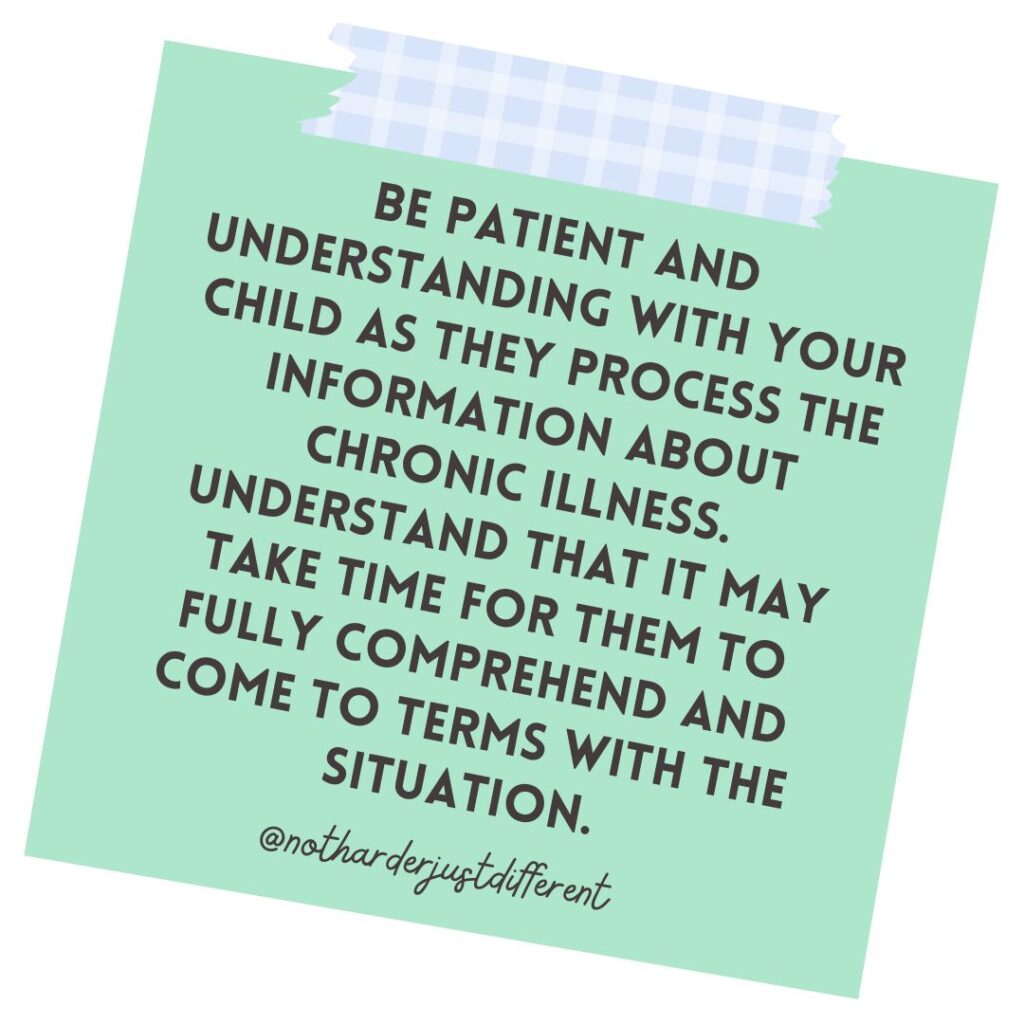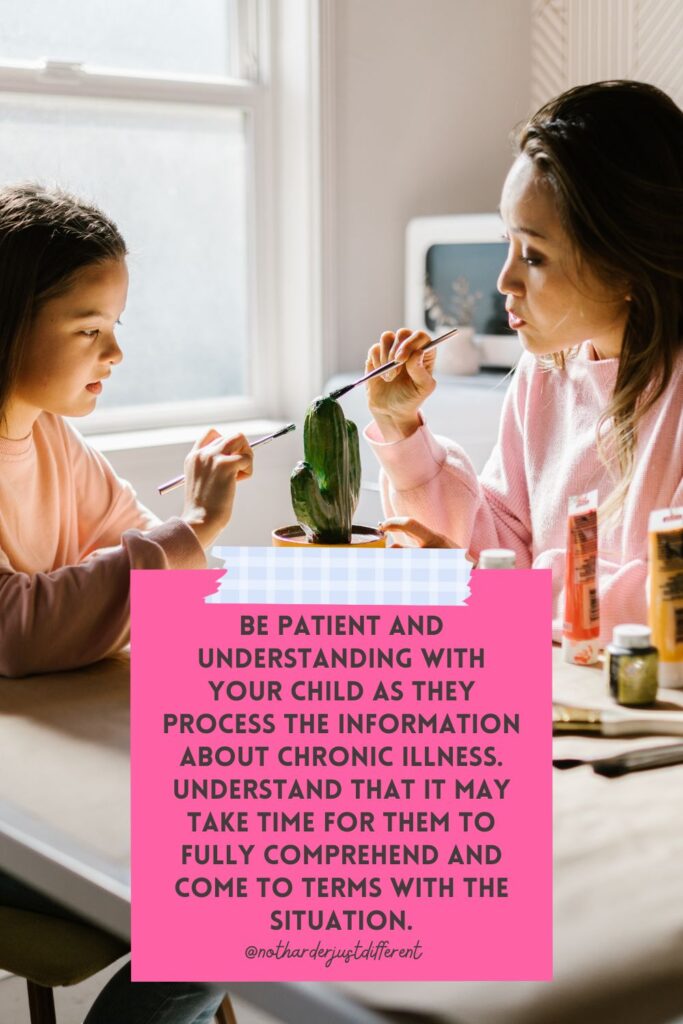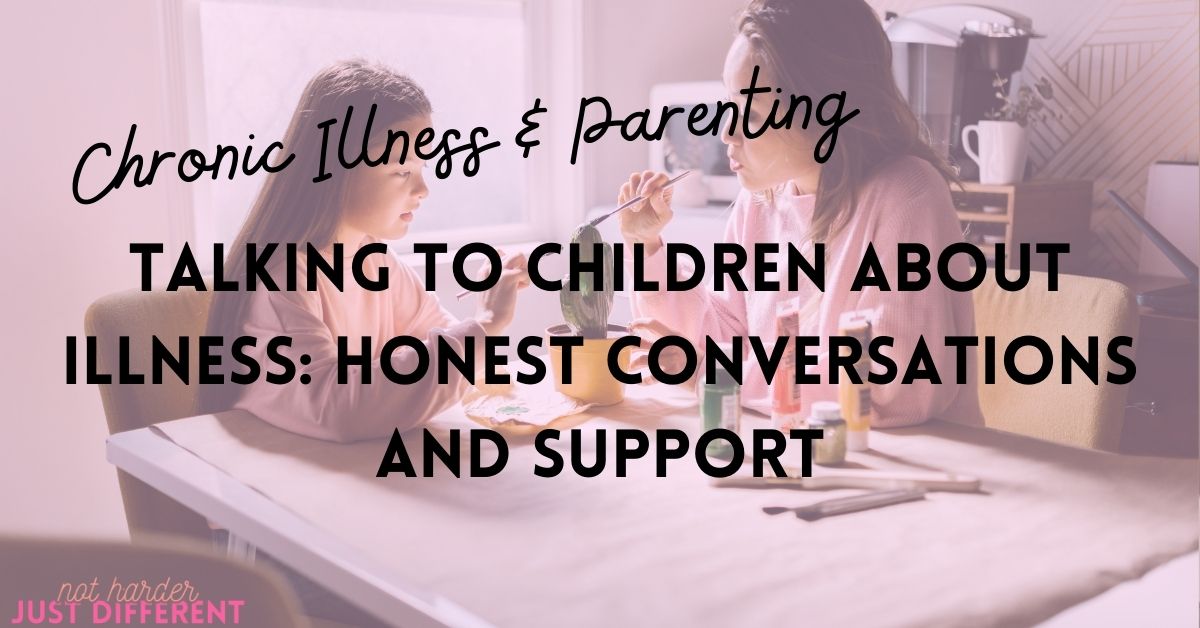Disclaimer: As a future Licensed Clinical Social Worker (LCSW) currently pursuing my master’s degree, I am passionate about sharing insights and information related to parenting, autism and homeschooling based on my personal experiences and research. However, the content shared on this blog is not intended to substitute professional advice, diagnosis, or treatment. Parenting is a deeply personal journey, and while I strive to provide valuable insights, every family and situation is unique. Readers are encouraged to consult with qualified professionals for personalized guidance tailored to their specific needs and circumstances.
Talking to our kids about chronic illness isn’t always easy, but it’s oh-so-important. Whether it’s explaining our own health challenges or discussing a family member’s illness, honesty and compassion are key. I wanted to give you some tips and strategies to help navigate talking to children about chronic illness with understanding. From choosing the right words to offering comfort and reassurance, I hope to have your back.
As parents, we want to shield our children from pain and discomfort, but sometimes life throws us curveballs like chronic illness. It’s natural to feel unsure about how to broach the topic with our little ones, but remember, honesty is always the best policy. By creating a safe space for open communication, we can help our children navigate the complexities of chronic illness with courage and resilience.
As chronic illness parents, you’ve likely had the situation where you’re sitting down with your child, trying to find the right words to explain why mommy or daddy isn’t feeling well. It’s a tough conversation, but it’s also an opportunity to strengthen the bond between you and your child. By approaching the topic with honesty, empathy, and patience, you can provide your child with the support and understanding they need to cope with the challenges of chronic illness.
15 Tips for Talking to Children About Chronic Illness
Start with Simple Language
When talking to children about chronic illness, use language that is age-appropriate and easy to understand. Avoid using medical jargon or complicated terms that may confuse or overwhelm your child.
Be Honest and Transparent
It’s important to be honest with your child about your own or a family member’s chronic illness. Provide clear and truthful explanations, and encourage your child to ask questions and express their feelings.
Create a Safe Space for Conversation
Ensure that your child feels comfortable discussing the topic of chronic illness with you. Choose a quiet, private setting where your child feels safe to ask questions and share their thoughts and emotions.
Listen and Validate
Take the time to listen to your child’s concerns and validate their feelings. Let them know that it’s okay to feel scared, sad, or confused, and reassure them that you are there to support them every step of the way.
Use Visual Aids
Consider using visual aids such as books, videos, or drawings to help illustrate and explain the concept of chronic illness to your child. Visuals can make abstract concepts more concrete and easier for children to understand.
Offer Reassurance and Comfort
Assure your child that they are not responsible for your illness or the illness of a family member. Reassure them that they are loved, safe, and supported, and emphasize that you will do everything you can to take care of them.
Encourage Expression of Emotions
Encourage your child to express their emotions openly and honestly. Let them know that it’s okay to feel a range of emotions, and provide opportunities for them to talk about their feelings and concerns.

Be Patient and Understanding
Be patient and understanding with your child as they process the information about chronic illness. Understand that it may take time for them to fully comprehend and come to terms with the situation.
Provide Age-Appropriate Information
Tailor the information you share about chronic illness to your child’s age and developmental level. Offer simple explanations and avoid overwhelming them with too much information at once.
Normalize Medical Care
Help your child feel comfortable with medical care by familiarizing them with routine doctor visits, tests, and treatments. Explain what to expect during medical appointments and emphasize the importance of taking care of our bodies.
Foster a Supportive Environment
Create a supportive environment at home where your child feels comfortable expressing their thoughts and emotions about chronic illness. Encourage open communication and offer reassurance and encouragement as needed.
Involve Your Child in Care
If appropriate, involve your child in caregiving tasks and routines related to chronic illness. This can help them feel empowered and give them a sense of purpose and contribution to the family.
Seek Professional Support
If you’re struggling to navigate conversations about chronic illness with your child, don’t hesitate to seek support from a pediatrician, therapist, or counselor. Professional guidance can offer valuable insights and strategies to help you support your child’s emotional well-being.
Practice Self-Care
Remember to prioritize your own self-care and well-being as you support your child through conversations about chronic illness. Take breaks when needed, seek support from loved ones, and engage in activities that help you recharge and rejuvenate.
Be Flexible and Adaptive
Be flexible and adaptive in your approach to talking to your child about chronic illness. Understand that conversations may evolve over time as your child grows and matures, and be prepared to adjust your communication style accordingly.
Navigating conversations about chronic illness with children can be challenging, but it’s also an opportunity to foster open, honest communication and strengthen family bonds. By approaching these conversations with empathy, patience, and honesty, we can provide our children with the support and understanding they need to cope with the challenges of chronic illness.



One response to “Talking to Children About Chronic Illness: Honest Conversations and Support”
[…] Talking to Children About Chronic Illness: Honest Conversations and Support […]